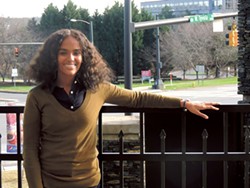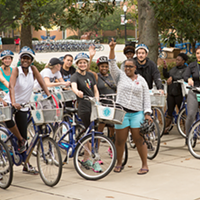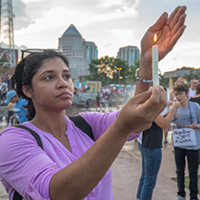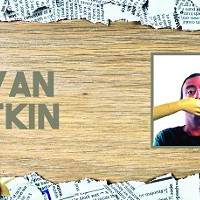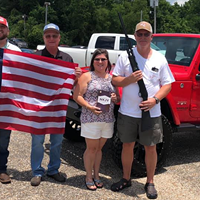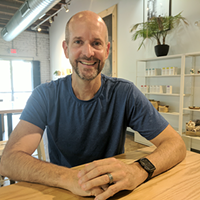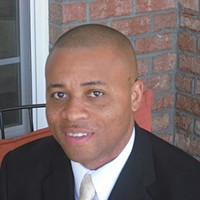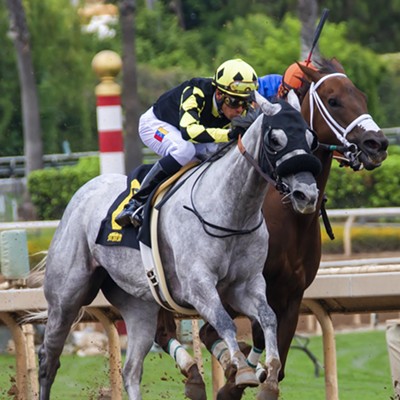Millennial candidate brings fresh ideas to west Charlotte
Campaigning for two
By Ryan Pitkin @pitkin_ryanJust two years ago, Lula Dualeh was finishing school as a journalism student at UNC Charlotte and unsure of her future.
"I was a writer. I was excited about that," Dualeh says. "I got a lot of awards in high school for my writing, but I didn't know if I could make it as a writer here in Charlotte."
She nearly took a job at a small publication where her uncle lives in Windsor, Connecticut, but Dr. Robbie Akhere, Dualeh's sociology professor-turned-mentor, convinced her to stick around and try community organizing.
Dualeh took a job with the League of Conservation Voters and soon became passionate about activism.
Her work with the LCV and ActionNC around issues like women's empowerment and the fight for a $15 minimum wage convinced Dualeh of a disconnect between organizers, their communities and their elected officials, and she wanted to bridge it.
She began her political career by running for the 3rd Vice Chair of the Mecklenburg County Democratic Party. She won that campaign last year when her opponent dropped out, and has served since March. Now, she's already looking higher.
On December 16, Dualeh filed her candidacy to be the District 2 representative on the Mecklenburg County Board of Commissioners. The 28-year-old daughter of Somalian immigrants aims to be youngest member of the board in Mecklenburg's history.
On March 15, Dualeh will face off against incumbent District 2 representative Vilma Leake and fellow Democrat Angela Davis in the most-contested county district primary in this year's election.
Creative Loafing caught up with Dualeh at one of her favorite spots in District 2, Nana's Soul Food Kitchen, to speak about the route she's taken over the last two years and what she hopes to accomplish if she wins.
Creative Loafing: How did you come to live in Charlotte and what was that experience like?
Lula Dualeh: I came in 1993 from New York with my family; my older sister, two brothers and my parents. My dad got in the car with my uncle and they just drove down south and stopped by all the cities. He decided to get in the car and go visit these other cities and he had never traveled down south before. He said, "Charlotte is going to be something amazing."
I grew up on the east side of Charlotte, then in 2001 we moved to District 2. I graduated from Phillip O. Berry Academy of Technology, which was a very exciting time for me. It was a time when I got to know a lot of people just from being out in the community with my neighbors.
What was your college experience like?
I struggled with school, not because it was difficult but I just didn't understand if it was for me or not. I didn't understand what a luxury that school was or how it could benefit me. Luckily my parents stayed on top of me. My dad was a businessman and my mom was an educator. It was, "Either you're going to get an education or you're going to go into the family business." For me, I wanted to be a writer. It took me a while to understand what a luxury education is here in this country.
Getting to know a lot of my cousins back home (in Somalia), they don't know anything about America. Talking to them really gave me a perspective I didn't have before, because they would give anything to be in school full-time or just to be here. I traveled with my family back home and it wasn't until I traveled that I really appreciated what I was given. And that's when I got focused about school. Even if I didn't understand what a degree would do for me, I understood that I needed to have a degree; that it would be a building block for me.
How did getting the job as a community organizer change your outlook?
For me, I didn't know working as an organizer was an actual job. I had no idea that was something that people actually do. When you're in high school and college you just think about being a doctor, a lawyer or any of those revered positions but no one tells you that you can make it as an organizer or start a nonprofit. So when (Dr. Akhere) told me that I was like, "What am I supposed to do with this?" I took it because I told myself I'm going to get a job and she said, "You can really learn about your community this way."
I never thought about environmental issues before (the LCV). I understood the importance of it, but I didn't understand how I could advocate for it. So they taught me the ropes about taking an issue and really believing in it and fighting for it and how you go about organizing around that. They were skill sets that I took with me and I said, "The things that I'm learning here I will be able to apply to any job that I'll have." Then I fell in love with it.
After I got that job I said, "Let me start thinking about what really gets me going. What wakes me up in the morning?" I realized that fighting for women's rights and equality is something that I'm passionate about. I'm really passionate about education. I said, "Let me see what I can do to organize around issues that are really near and dear to my heart."
How did you transition from activism to politics?
After LCV, I got a call to be the regional director for then-Senator Kay Hagan's campaign. I realized after that job that it was important for me to get involved politically. Social issues that I was fighting for needed the political power behind them in order to create policy change or reform. So after I made that connection I said I wanted to get involved and learn what I can do.
Being involved with the Mecklenburg County Democratic Party gave me an opportunity to work closely with elected officials, to understand the process, to make the connections to organizers and their issues as well as the elected officials, because a lot of the time they don't think the same way. We don't speak the same language and some times the way we go about things – whether its rallies or marching – that's something that they don't understand. When they see it they just think that we're being combative when in actuality that's the only way we know how to get your attention; politicians and people in the community as well.
There have been plenty of times where I've been with friends or older people and they say, "What are they marching about now? Why are they rallying now?" They don't understand, that's our language. So being able to be a connector between elected officials and community members and community organizers and making sure that they hear each other is important to me.
What are some issues of import to you in District 2 right now?
It goes back to education; that every child should be able to get an adequate education, because I understand what it did for me. I graduated from Phillip O. Berry and fortunately – since it was a new school – the people were more hands-on and more excited about it and people were watching closely and we were attended to. However, a lot of the schools here aren't being attended to and they're being swept under the rug. We have more Title 1 schools here in District 2 than anywhere else in the county. The students here deserve a fair chance. That genius is here in District 2. There are children here who want to be the next Steve Jobs but it's our job to make sure that we cultivate that creativity. Education is really important to me; to know that we can provide a student with those building blocks to propel them to a life that they want to lead and excel.
What are your thoughts on current representative Vilma Leake's leadership?
I've met her and it's unfortunate because the few times that I have reached out to her or seen her it wasn't the nicest of moments. I have other friends who have reached out to her about unemployment or affordable housing or just wanting to talk to her to say, "Listen, I'm a young person who is educated and I can't get a job. I've done what I was supposed to do, what can you do as my elected official to help me?" They didn't get a response.
She has been in the community and she has served for quite some time, however, as District 2 continues to change and grow and evolve, leadership should mirror that evolution. With me, I know that I can champion for District 2 because I grew up here, and I understand the issues and needs of the community. As an organizer, that's what I've been trained to do. It's easy for me. I'm able to go into the underserved communities to do need assessments and to go to residents and say, "Hey, I know I need your help in order to find a solution."
You're a devout Muslim. How does that shape who you are?
It's the foundation of who I am. It's not something that I shy away from. Being a Muslim woman and understanding that Islam is a religion of peace, unity and love has been the bedrock of who I am. The number one most important value in my life is my faith. Being a Muslim woman and understanding the teachings of Islam has helped me be a more patient person. It helps me build relationships better. It helps me work for my community and serve my community because ultimately I'm serving God and I understand that's my purpose. It doesn't hinder me in any type of way socially or politically. A lot of times I'm the only Muslim woman that people know, so I understand the responsibility that comes with that, especially with the climate today.
How has that national climate — which has involved fear-mongering around your religion — affected you over the last year or so?
It's very dangerous. The rhetoric of Donald Trump and others like him, I understand the damaging effects that his words can have. He's a celebrity, he's an entertainer, so he's going to say whatever is most provocative in order to get that audience and attention. But his words are really affecting Muslim lives. I understand the danger of that. I've seen it before when 9/11 happened and I see the same thing happening today.
When people are fearful of what they don't understand then dangerous things can happen. So for me, whenever I go out into the community or whenever I talk to people about Islam, which is something I don't shy away from, I say — like with anything else — you need to do your own research. Every Friday when I go to prayer, I make a point to post on Facebook and I tell people to read this verse, or read this surah (a chapter in the Quran) and read for yourself what we follow and what we believe, because if you don't do the research for yourself you'll never really understand what Muslims or Islam is about.
What has your youth brought to the table in this campaign?
It's really exciting because as a first-time candidate the support is overwhelming. It's created this new conversation around politics in Mecklenburg County, because now young people who I grew up with and went to middle school, high school and college with and who I've worked with are saying, "Wow, you're running?" They didn't even think of that as an option, because a lot of the times they think that politics is for older people who have more access to resources. So when I tell them, "Hey I am running, and the only thing that makes me electable is your vote," then it changes their way of thinking. They say, "Wow, I'm going to vote for you," or if they live elsewhere in the county then they say, "Then who can I vote for?" and it starts a new conversation.
Vilma Leake has been representing the area on the school board and county commission for nearly two decades combined. Are you optimistic you can beat her?
I am very optimistic, because I have been in the community working. A lot of people recognize that work and they're reaching out to me through Facebook and Twitter and calling and texting to say, "I've heard that you're running and I'm very excited. What can I do to help?" That's an organic response, that's not something that's manufactured. So the fact that they're reaching out to me and wanting to help puts an extra battery in my back to really run this campaign.
Speaking of...
Latest in Newsmakers
More by Ryan Pitkin
-
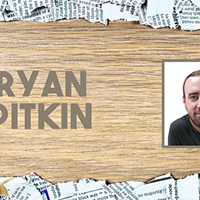
You're the Best... of Charlotte
Oct 27, 2018 -
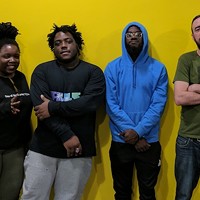
Listen Up: Cuzo Key and FLLS Go 'Universal' on 'Local Vibes'
Oct 25, 2018 -
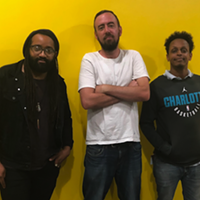
Listen Up: KANG is Back and Bla/Alt on 'Local Vibes'
Oct 18, 2018 - More »
Calendar
-

Wine & Paint @ Blackfinn Ameripub- Ballantyne
-

Queen Charlotte Fair @ Route 29 Pavilion
-

NEW WINDOW GALLERY-Pat Rhea-ACRYLIC PAINTINGS-April 05-30 2024 VALDESE, NC 28690 @ New Window Gallery/Play It Again Records
- Through April 30, 12 p.m.
-

TheDiscountCodes
-

Face to Face Foundation Gala @ The Revelry North End
-
Five Common Reasons Why Small Businesses Fail
-
Homer's night on the town 41
If you drank a shot with the Knights mascot on Sept. 20, you were basically harboring a fugitive
-
6 Factors to Consider When Buying Kratom Online 5

